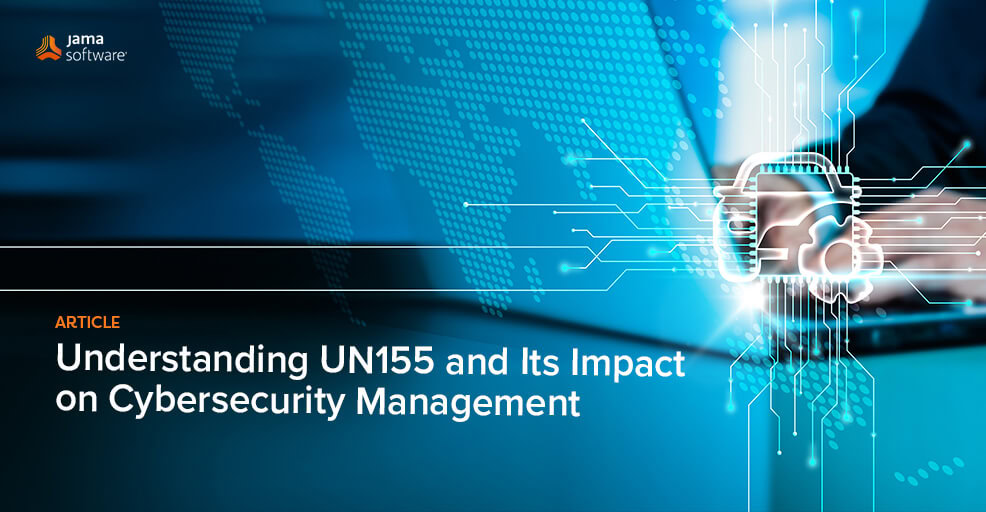
Understanding UN155 and Its Impact on Cybersecurity Management
In the ever-evolving landscape of cybersecurity, staying ahead of emerging threats and regulations is crucial for organizations worldwide. One such regulatory framework making waves in the cybersecurity community is UN155. This post aims to shed light on UN155 and its significance in cybersecurity management.
What is UN155?
UN155 is a regulatory framework established by the United Nations to enhance cybersecurity practices across various sectors. The framework sets forth comprehensive guidelines and standards for organizations to protect their information systems, data, and infrastructure from cyber threats. It emphasizes a proactive approach to cybersecurity, encouraging organizations to implement robust security measures and continuously monitor and adapt to the evolving threat landscape.
RELATED: Jama Connect® for Automotive
Key Components of UN155
UN155 encompasses several critical components designed to strengthen cybersecurity management:
- Risk Assessment and Management: Organizations are required to conduct regular risk assessments to identify potential vulnerabilities and threats. This involves evaluating the likelihood and impact of various cyber risks and implementing appropriate mitigation strategies.
- Incident Response and Reporting: UN155 mandates the establishment of incident response plans to swiftly address and mitigate cybersecurity incidents. Organizations must also report significant incidents to relevant authorities, ensuring transparency and accountability.
- Data Protection and Privacy: Protecting sensitive data is a cornerstone of UN155. Organizations must implement stringent data protection measures, including encryption, access controls, and data minimization, to safeguard personal and sensitive information.
- Continuous Monitoring and Improvement: UN155 emphasizes the importance of continuous monitoring and improvement of cybersecurity practices. Organizations are encouraged to regularly review and update their security measures in response to new threats and vulnerabilities.
- Training and Awareness: Educating employees about cybersecurity risks and best practices is crucial. UN155 requires organizations to conduct regular training and awareness programs to ensure that staff members are equipped to recognize and respond to cyber threats.
RELATED: Buyer’s Guide: Selecting a Requirements Management and Traceability Solution for Automotive
The Impact of UN155 on Cybersecurity Management
The implementation of UN155 has significant implications for cybersecurity management:
- Enhanced Security Posture: By adhering to the guidelines set forth by UN155, organizations can significantly enhance their security posture. Proactive risk assessments, robust incident response plans, and continuous monitoring contribute to a more resilient cybersecurity framework.
- Regulatory Compliance: Compliance with UN155 is not just a best practice; it is often a legal requirement. Organizations that fail to comply with the framework may face legal penalties, reputational damage, and financial losses.
- Improved Incident Response: With established incident response plans, organizations can respond more effectively to cybersecurity incidents. This minimizes the impact of breaches and ensures a quicker recovery, reducing downtime and financial losses.
- Increased Stakeholder Confidence: Demonstrating compliance with UN155 can enhance stakeholder confidence. Clients, partners, and investors are more likely to trust organizations that prioritize cybersecurity and adhere to recognized standards.
- Global Harmonization: UN155 promotes a standardized approach to cybersecurity, fostering global harmonization of security practices. This is particularly important for multinational organizations operating in diverse regulatory environments.
UN155 represents a significant step forward in the global effort to enhance cybersecurity management. By adopting the framework’s guidelines and principles, organizations can bolster their defenses against cyber threats, ensure regulatory compliance, and build trust with stakeholders. As the cybersecurity landscape continues to evolve, frameworks like UN155 play a pivotal role in shaping a secure and resilient digital future.
Note: This article was drafted with the aid of AI. Additional content, edits for accuracy, and industry expertise by McKenzie Jonsson and Matt Mickle.
- Bosch and the Chiplet Revolution: Enabling Software-Defined Mobility - February 24, 2026
- Requirements Management Software Jama Connect Breaks Records for Scalability - February 9, 2026
- Next Generation Nuclear: Reactor Innovations Shaping 2025 - November 11, 2025